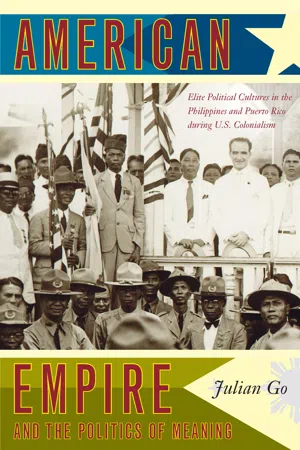
American Empire and the Politics of Meaning
Elite Political Cultures in the Philippines and Puerto Rico during U.S. Colonialism
- English
- PDF
- Available on iOS & Android
American Empire and the Politics of Meaning
Elite Political Cultures in the Philippines and Puerto Rico during U.S. Colonialism
About This Book
When the United States took control of the Philippines and Puerto Rico in the wake of the Spanish-American War, it declared that it would transform its new colonies through lessons in self-government and the ways of American-style democracy. In both territories, U.S. colonial officials built extensive public school systems, and they set up American-style elections and governmental institutions. The officials aimed their lessons in democratic government at the political elite: the relatively small class of the wealthy, educated, and politically powerful within each colony. While they retained ultimate control for themselves, the Americans let the elite vote, hold local office, and formulate legislation in national assemblies.
American Empire and the Politics of Meaning is an examination of how these efforts to provide the elite of Puerto Rico and the Philippines a practical education in self-government played out on the ground in the early years of American colonial rule, from 1898 until 1912. It is the first systematic comparative analysis of these early exercises in American imperial power. The sociologist Julian Go unravels how American authorities used "culture" as both a tool and a target of rule, and how the Puerto Rican and Philippine elite received, creatively engaged, and sometimes silently subverted the Americans' ostensibly benign intentions. Rather than finding that the attempt to transplant American-style democracy led to incommensurable "culture clashes, " Go assesses complex processes of cultural accommodation and transformation. By combining rich historical detail with broader theories of meaning, culture, and colonialism, he provides an innovative study of the hidden intersections of political power and cultural meaning-making in America's earliest overseas empire.
Frequently asked questions
Information
Table of contents
- Cover
- CONTENTS
- Acknowledgments
- Introduction: Colonialism and Culture in the American Empire
- Chapter 1: Tutelary Colonialism and Cultural Power
- Chapter 2: Domesticating Tutelage in Puerto Rico
- Chapter 3: Winning Hearts and Minds in the Philippines
- Chapter 4: Beyond Cultural Reproduction
- Chapter 5: Divergent Paths
- Chapter 6: Structural Transformation in Puerto Rico
- Chapter 7: Cultural Revaluation in the Philippines
- Conclusion: Returning to Culture
- Appendix
- Notes
- References
- Index